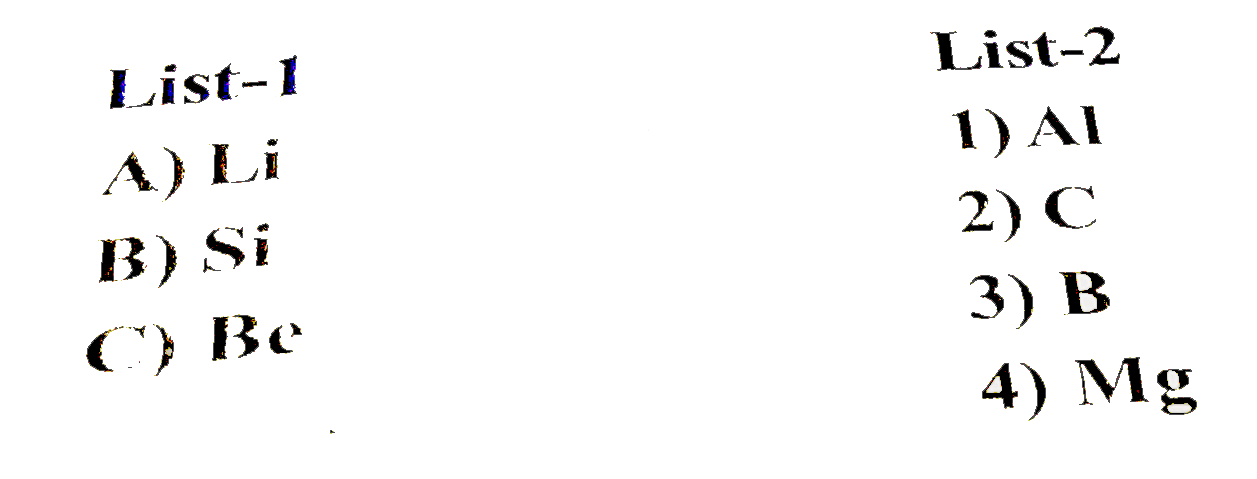Complete Solutions to EXERCISE - 4 of chapter CLASSIFICATION OF ELEMENTS AND PERIODICITY of Class 11 book with complete answers and questions
| Class 11 | CHEMISTRY |
| Chapter | CLASSIFICATION OF ELEMENTS AND PERIODICITY |
| NARAYANA | EXERCISE - 4 |
| Number Of Questions | 17 |
| Academic Year | 2023-24 |
`{:("Column -I","Column -II"),(("Atomic no. of elemets"),"(IUPAC name)"),((A)105,(P)"Unn"),((B)107,(Q)"Uns"),((C )109,(R )"Unp"),((D)110,(S)"Une"):}`
View SolutionMatch the following
`{:("Type - I","Type - II"),("Series","Elements"),("(A) 3d","(1) Sc[21] to Zn (30)"),("(B) 4d","(2) La(57), Hf (72)to Hg (80)"),("(C ) 5d","(3) Ce(58) to Lr (103)"),("(D) 6d","(4) Y (39) to Cd(48)"),(,"(5) Ac (89), Rf (104)to Mt (109)"):}`
The correct match is
View Solution`{:("Type - I","Type - II"),("Property","Element with the highest value"),("(A) IP","(1) Cl"),("(B) EN","(2) Cs"),("(C ) EA","(3) He"),("(D) atomic size","(4) F"),(,"(5) H"):}`
View SolutionMatch the following
`{:("List - 1 List - 2"),(" (High value is observed for)"),("(A) Ionisation potential (1) Chlorine"),("(B) Electron positivity (2) Caesium"),("(C ) Electron affinity (3) Helium"),("(D) Oxidation state (4) Fluorine"),(" (5) Osmium"):}`
The correct match is
View SolutionMatch the following in view of diagonal relation

The correct match is
View SolutionConsider the isoelectronic species, `Na^(+),Mg^(2+),F^(-)` and `O^(2-)`. The correct order of increasing length of their radii is:
View SolutionWhich of the following is not an actinoid?
View SolutionThe order of screeing effect of electrons of `s,p,d` and `f` orbitals of a given shell of an atom on its outer shell electrons is:
View SolutionThe first ionisation potential of `Na,Mg,Al` and `Si` are in the order
View SolutionThe electronic configuration of gadolinium (At. No 64) is:
View SolutionThe statement that is not correct for periodic classification of elements is
View SolutionAmong halogens, the correct order of amount of energy released in electron gain (electron gain enthalpy) is:
View SolutionThe period number in the long form of the periodic table is equal to
View SolutionThe elements in which electrons are progressively filled in 4f-orbitals are calleD:
View SolutionWhich one of the following is correct order of the size of iodine species ?
View SolutionThe formation of oxide ion `O^(2-)(g)` from oxygen atom requires first an exothermic and then an endothermic step as shown below
`O(g)+e^(-) rarr O^(-)(g), DeltaH^(-) = - 141 kj mol^(-1)`
`O^(-)(g) +e^(-) rarr O^(2-) (g), DeltaH^(-) =+ 780 kj mol^(-1)`
Thus, process of formation of `O^(2-)` in gas phase is unfavourable even through `O^(2-)` is isoelectronic with neon. It is due to the fact that A) oxygen is more electronegative B) addition of electron in oxygen results in larget size of the ion C) electron repulsion outweights the stability gained by achieving noble gas configuration D) `O^(-)` ion has comparatively smaller size than oxygen atom
View SolutionElectronic configuration of four elements A, B ,C and D are given below
A) `1s^(2), 2s^(2), 2p^(6)`
B) `1s^(2), 2s^(2), 2p^(4)`
C) `1s^(2), 2s^(2), 2p^(6), 3s^(1)`
D) `1s^(2), 2s^(2), 2p^(5)`
Which of the following is the correct order of increasing tendency to gain electron?
View Solution
EXERCISE - 4 questions and complete solutions for chapter CLASSIFICATION OF ELEMENTS AND PERIODICITY of NARAYANA CHEMISTRY (HINGLISH) of Class 11